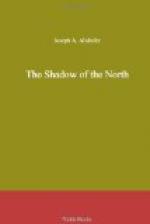He looked with admiration at the magnificent trees spreading away on every side, and the foliage in its most splendid, new luxuriant green.
“It is worthy, Tayoga,” said Robert, whose soul was like that of the Onondaga, “and it takes Manitou himself a century or more to grow trees like these.”
“Some of them, I dare say, are three or four hundred years old or more,” said Willet, “and the forest goes west, so I’ve heard the Indians say, a matter of near two thousand miles. It’s pleasant to know that if all the axes in the world were at work it couldn’t all be cut down in our time or in the time of our children.”
Tayoga’s heart swelled with indignation at the idea that the forest might be destroyed, but he said nothing, as he knew that Willet and Robert shared his feeling.
“Here’s your rifle, Tayoga,” said the hunter; “I suppose you didn’t have an occasion to use your bow and arrows.”
“No, Great Bear,” replied the Onondaga, “but I might have had the chance had I come earlier.”
“What do you mean by that?”
“I saw on the grass a human trace. It was made by a foot clothed in a moccasin, a large foot, a very large foot, the foot of a man whom we all have cause to hate.”
“I take it you’re speaking of Tandakora, the Ojibway.”
“None other. I cannot be mistaken. But the trail was cold. He and his warriors have gone north. They may be thirty, forty miles from here.”
“Likely enough, Tayoga. They’re on their way to join the force the French are sending to the fort at the junction of the Monongahela and the Alleghany. Perhaps St. Luc—and there isn’t a cleverer officer in this continent—is with them. I tell you, Tayoga, and you too, Robert, I don’t like it! That young Washington ought to have been sent earlier into the Ohio country, and they should have given him a much larger force. We’re sluggards and all our governors are sluggards, except maybe Shirley of Massachusetts. With the war just blazing up the French are already in possession, and we’re to drive ’em out, which doubles our task. It was a great victory for us to keep the Hodenosaunee on our side, or, in the main, neutral, but it’s going to be uphill work for us to win. The young French leaders are genuine kings of the wilderness. You know that, Robert, as well as I do.”
“Yes,” said the youth. “I know they’re the men whom the English colonies have good cause to fear.”
When he spoke he was thinking of St. Luc, as he had last seen him in the vale of Onondaga, defeated in the appeal to the fifty sachems, but gallant, well bred, showing nothing of chagrin, and sure to be a formidable foe on the field of battle. He was an enemy of whom one could be proud, and Robert felt an actual wish to see him again, even though in opposing ranks.
“We may come into contact with some of ’em,” said the hunter. “The French are using all their influence over the Indians, and are directing their movements. I know that St. Luc, Jumonville, Beaujeu, Dumas, De Villiers, De Courcelles and all their best men are in the forest. It’s likely that Tandakora, fierce and wild as he is, is acting under the direction of some Frenchman. St. Luc could control him.”




